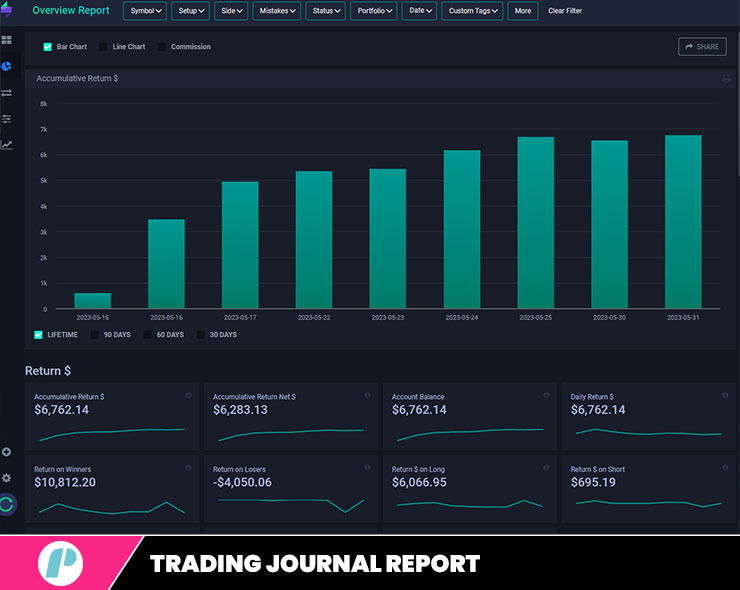Imagine this: you’re sitting at your trading desk, facing another volatile market day. The screen in front of you is filled with numbers, candlesticks, and your heart is racing with every tick. Sound familiar? Well, you’re not alone. Trading can be a high-stakes game, but there’s one simple habit that can make all the difference—keeping a trading journal. By recording your trades, emotions, and market conditions, you’ll gain invaluable insights into your trading habits and mindset. So, why aren’t more traders doing this?
Many traders struggle with emotional decision-making, impulsive actions, and inconsistent results. The problem often lies in a lack of reflection and learning from past experiences. Without a journal, you’re essentially flying blind, repeating mistakes without fully understanding why you make them. But here’s the good news—there’s a solution, and it’s a straightforward one: keep a trading journal.
In this article, I’ll dive into how maintaining a trading journal can improve your trading psychology and results, and how it can help you manage your emotions, optimize your strategies, and ultimately, become a more disciplined and confident trader. Below, you’ll discover:
- The psychological benefits of journaling for traders
- How a trading journal helps improve decision-making and strategy optimization
- Practical steps to start your own trading journal
- Common mistakes traders make and how to avoid them
By the end of this article, you’ll see how a simple habit can transform your trading mindset, improve your risk management, and lead to more consistent profits. Let’s dive in!
The Psychological Benefits of Keeping a Trading Journal
Increased Self-Awareness
One of the greatest advantages of keeping a trading journal is the ability to reflect on your emotions and decision-making. Every time you enter a trade, make a note of how you’re feeling—are you anxious? Overconfident? Fearful? Writing these emotions down gives you a clear record of how your mental state affects your trading decisions.
As you review your journal over time, patterns begin to emerge. You might notice that you tend to make poor decisions when you’re feeling anxious or rush into trades after a winning streak. This awareness allows you to take control of your emotions and make more rational decisions in future trades.
Emotional Control
Fear and greed are two emotions that frequently derail traders, often leading to impulsive decisions. A trading journal helps you identify these emotional triggers, and more importantly, it helps you develop strategies to manage them.
For example, after a few losing trades, your journal might reveal that you’re more likely to take higher risks in an attempt to “get even.” Once you identify this tendency, you can create a strategy that helps you stay calm and stick to your trading plan, even after a loss.
Over time, this discipline can significantly improve your emotional control, making you a more consistent and level-headed trader.
Stress Management
Let’s face it—trading is stressful. But journaling gives you a safe space to vent and process your emotions, which can reduce mental clutter and help you stay calm during intense market conditions.
When you’re feeling overwhelmed or stressed out about a trade, taking a moment to write down your thoughts can help clear your mind and reframe your perspective. In fact, studies have shown that journaling can reduce anxiety and stress, helping you maintain a healthier mindset as you trade.
It’s like having a personal coach who is always available to guide you through your emotional rollercoaster. By recording your mental state, you’ll notice improvements in your ability to manage stress and make sound trading decisions.
Improving Your Trading Results with a Journal
Better Decision-Making
A trading journal isn’t just about tracking your emotions; it’s also a tool for tracking your decision-making process. By writing down why you took a trade, what your reasoning was, and what the market conditions were at the time, you create a valuable record that allows you to assess your thought process in hindsight.
Let’s say you take a trade based on a hunch or because you’ve been in a losing streak and feel the need to win. Reviewing your journal later will help you realize that the trade wasn’t based on a sound strategy, but rather on emotional impulses. This insight is crucial for improving your decision-making over time.
Strategy Optimization
Your trading journal helps you identify which strategies are working and which aren’t. By reviewing your trades, you can spot trends and refine your methods to be more effective in the future.
For example, after tracking several trades, you might notice that your trades based on technical analysis are more successful than those based on market sentiment. Armed with this information, you can focus more on technical strategies, optimizing your approach to be more in line with what’s proven to work for you.
Long-Term Consistency
One of the key factors to success in trading is consistency. Trading journals help you develop this consistency by reinforcing discipline and keeping you accountable for your actions.
After every trade, your journal holds you accountable for your decisions. If you break your own rules or deviate from your plan, your journal will highlight that, forcing you to address the issue and correct it moving forward.
In this way, journaling fosters a sense of responsibility and long-term growth. By tracking your trades and progress, you’ll be able to see just how far you’ve come, which is incredibly motivating and can help you stay on track for future success.
Case Study: A Trader’s Success Using a Trading Journal
Let’s look at a real-life example of how a trader transformed their results using a trading journal. Mark, a seasoned forex trader, had been struggling with consistency for years. His trades were often reactive, driven by emotions like fear or overconfidence. But everything changed when he started journaling.
At first, Mark found it difficult to write down his feelings, but over time, he began to notice patterns. He realized that his impulsive trades were mostly occurring when he was feeling overconfident or after a string of losses. By reflecting on these triggers in his journal, Mark was able to design strategies to mitigate the emotional impact of these patterns. As a result, his decision-making improved, and so did his consistency and profits.
This is just one example of how journaling can transform not only your trading psychology but also your trading results. It’s a simple tool that can lead to significant improvements in your trading journey.
Image: The Emotional Cycle of Trading
As shown in the image, the emotional cycle of trading is common for many traders, but a journal can help you break free from it. By understanding where you are in this cycle, you can better manage your emotions and avoid the pitfalls that lead to poor decision-making.
Getting Started with Your Trading Journal
Choosing the Right Tools
To begin, you’ll need the right tools. You can go old-school with pen and paper, or you can opt for digital tools like apps or spreadsheets. It’s up to you, but the key is consistency. Choose a method that feels comfortable, but ensure it’s something you can keep up with regularly.
What to Record
Here’s a basic outline of what you should include in your journal:
- Trade entry and exit points
- Rationale for the trade
- Emotions felt before, during, and after the trade
- Market conditions (e.g., news, trends, volatility)
- Results (win, loss, or break-even)
By tracking these details, you can look back on your trades and assess your decision-making, helping you to learn from both your wins and losses.
Common Mistakes to Avoid
Many traders make the mistake of journaling inconsistently or not reviewing their entries. A journal without regular reflection is just a record, not a tool for improvement. Make it a habit to look over your journal weekly, and take note of recurring patterns.
Another mistake is overloading your journal with irrelevant details. Stick to what matters—focus on your strategy, emotions, and decision-making. Keep it concise but comprehensive.

FAQ
How often should I update my trading journal?
It’s essential to update your journal after every trade, regardless of whether you win or lose. The key to getting the most value from your trading journal is consistency. Make it a habit to write down your thoughts, decisions, and emotions each time you trade. This will ensure that you have a full picture of your progress over time.
Can a trading journal really improve my trading psychology?
Yes! A trading journal helps you to recognize patterns in your behavior and emotions. By understanding when and why you make certain decisions, you can take proactive steps to improve your trading mindset. Tracking your emotional triggers and reactions to the market allows you to develop strategies to handle stress and stay disciplined.
What are the most important things to record in my trading journal?
The most crucial aspects to record are your trade rationale, the emotional state before and after the trade, the market conditions at the time, and the results (win, loss, or break-even). These details will provide you with the insights necessary to analyze your decision-making and emotional responses, making it easier to refine your trading strategies and avoid repeating mistakes.
Recap of Key Points
So far, we’ve explored how a trading journal can significantly boost your trading psychology and results. A journal helps improve your emotional control, enhances decision-making, and provides a structured approach to learning from your trades. By keeping track of your thoughts and strategies, you’ll develop the consistency necessary for long-term success in the markets.
Incorporating a trading journal into your routine may seem like a small step, but it’s a game-changer for improving your mindset and your trading performance. It’s a tool that allows you to reflect, learn, and grow as a trader. The more disciplined you are about journaling, the more likely you are to see consistent improvements in your trading results.
Remember, trading is as much about mastering your mind as it is about mastering the markets. With a trading journal, you gain the clarity and self-awareness necessary to take control of both. So, grab a pen (or open an app) and start journaling your way to success today!

